Apple cider vinegar (ACV) is one of the oldest foods, and it's been in use for thousands of years. Not only is it easy to make homemade apple cider vinegar, but it's one of the most versatile tools you have in your home and medicine cabinet.
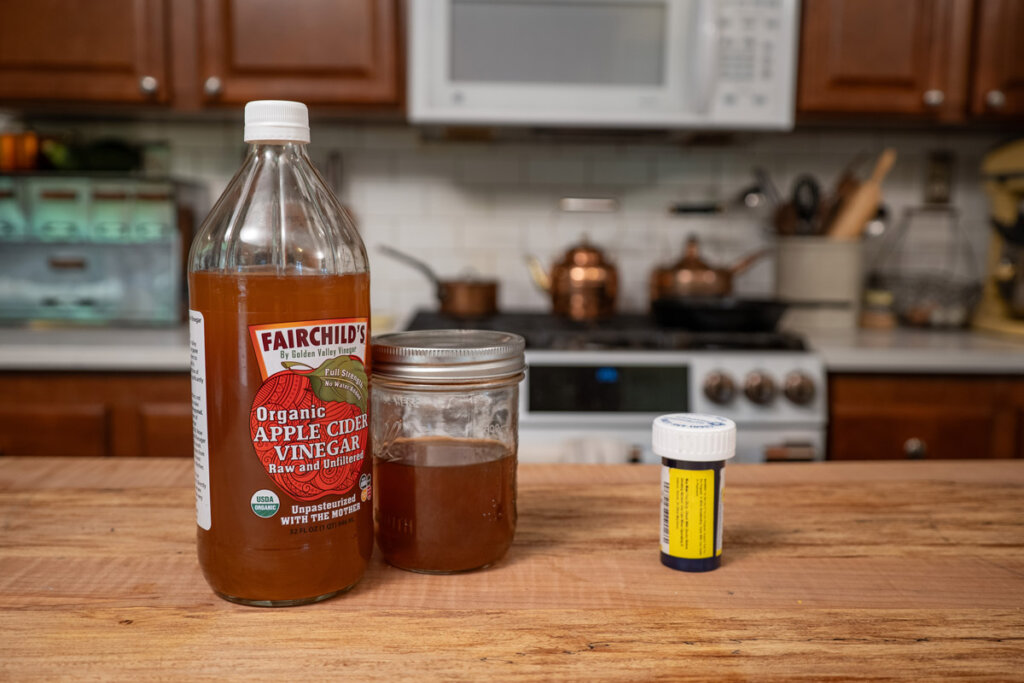
As a modern homesteader and natural living pioneer, I absolutely adore having an item I can put to use in many different ways. Especially when said item is one I can make at home with ease.
I love making homemade apple cider vinegar, as well as other homemade fruit vinegars. Looking to preserve your apple harvest? Be sure to check out this post on 12 ways to preserve apples at home.
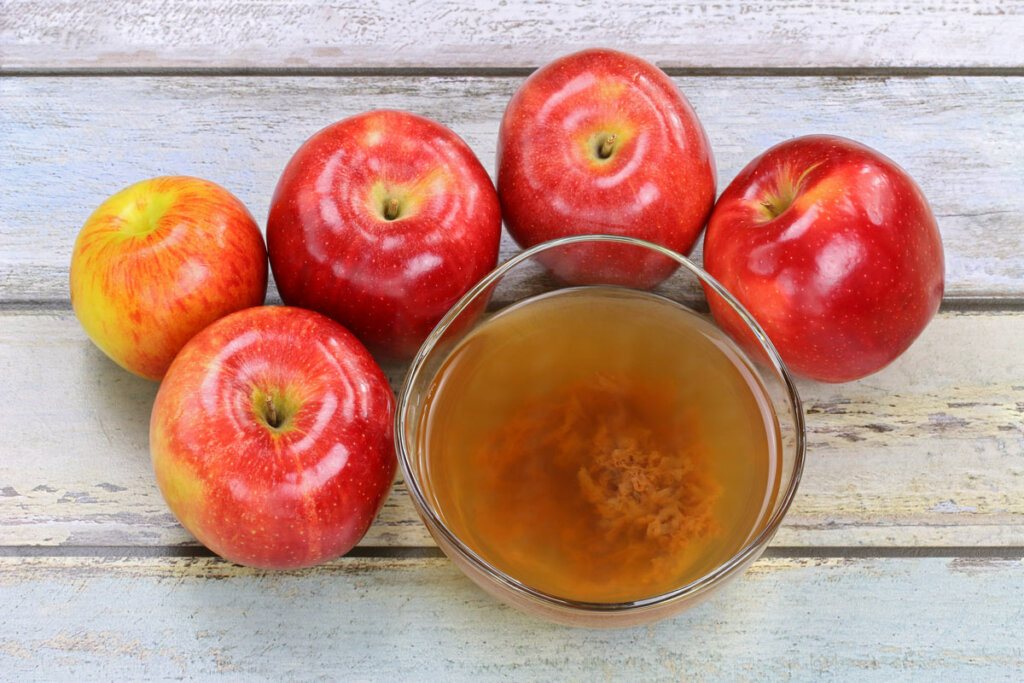
Apple cider vinegar is simply fermented apples. We're quickly learning that not only is fermentation of our food a way to preserve it (our ancestors knew this), but it also has many health benefits.
Apple cider vinegar contains pectin, B vitamins, folic acid, niacin, Vitamin C, minerals potassium, magnesium, calcium and iron. There are a whole host of uses for this amazing ingredient.
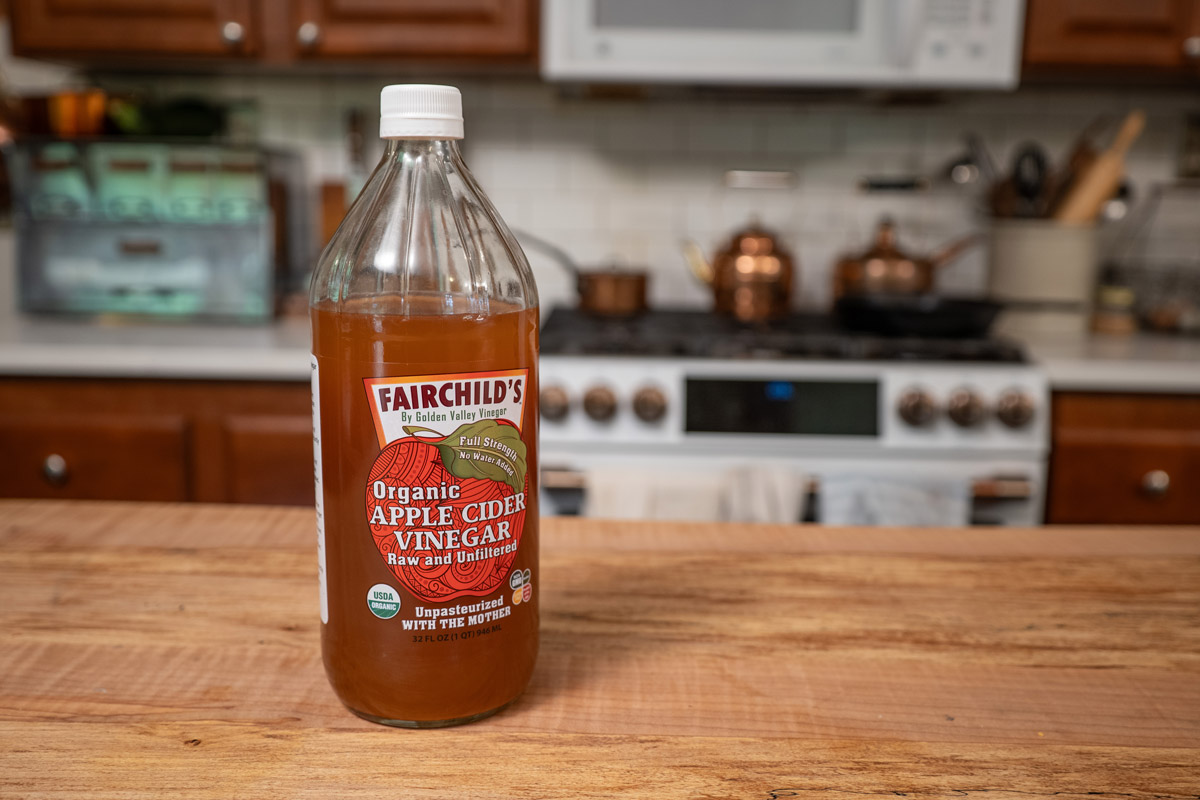
Not all apple cider vinegar is created equal! Whether making homemade apple cider vinegar or buying it at the store. Be sure you're getting or making real, organic, raw apple cider vinegar with the Mother.
Homemade apple cider vinegar recipes can vary. For instance, my recipe is actually an apple scrap vinegar, which is a fantastic use of the peels and apples left over after processing them, but apple scrap vinegar won't give you a full-strength homemade whole apple cider vinegar.
For a good homemade apple cider vinegar, check out my ACV recipe here.
If you're not making ACV at home, then look for one that's raw with the mother. The “Mother” is that kind of cloudy, stringy, cob webby thing floating inside the vinegar. And because apples have such a high pesticide load, go for organic. You also want to make sure the company making the vinegar is using the whole apples (not scraps and cores) and not diluting it with water.
This post is actually sponsored by Fairchild's Apple Cider Vinegar, which is the brand I reach for anytime I'm using apple cider vinegar in a canning recipe or if I run out of my homemade version.
Though there's little concern if you're consuming apple cider vinegar correctly, it's important to note that too much apple cider vinegar can cause a reduction in potassium levels and bone density.
Furthermore, undiluted apple cider vinegar can irritate the tissue in the back of the throat and mouth, as well as cause damage to your tooth enamel. Dilution is your friend!
Pro Tip: Whenever canning with any vinegar, it's important for the safety of your recipe not to use homemade ACV because you can't test the acidity level of your homemade vinegars.
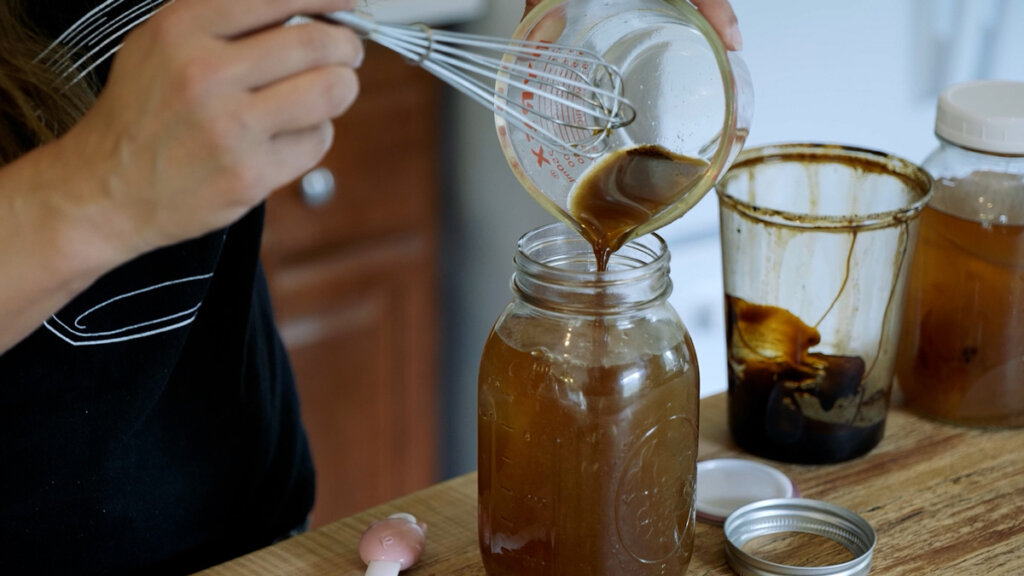
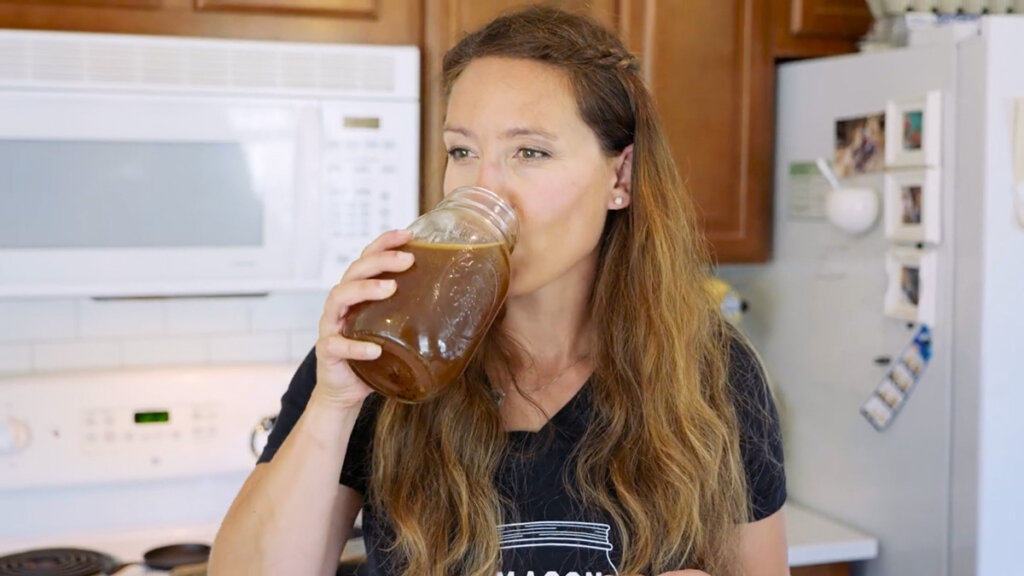
Disclaimer: I'm not a doctor, and this is not providing any kind of diagnosis or treatment. This article is for informational and entertainment purposes only. Check with your healthcare practitioner before making any changes.
Apple cider vinegar is thought to help with many areas of our health.
With apple cider vinegar, a little bit goes a long way. It's best thought to start with 1 to 2 teaspoons and always dilute with water or liquid if drinking it. Some people work up to 1 to 2 Tablespoons per day, but it's not recommended to go over this amount.

“It’s easy to see why people might expect apple cider vinegar to be good for your health.
It’s a rich source of antioxidants called polyphenols, which help support your “good” gut bacteria.
The acetic acid it contains is also antibacterial and antifungal, which explains why people have used vinegar to clean wounds as far back as the Ancient Greeks.
Some people believe that apple cider vinegar’s potential health benefits come from “the mother.”
The mother is the probiotic blend of bacteria and yeasts, which you can see as wispy strands in unfiltered apple cider vinegar.
Probiotic foods contain “good” bacteria that can help to support your gut microbiome — the trillions of bugs that live in your gut. These microbes are essential to good health, and everyone’s gut microbiome is unique.” (Source)
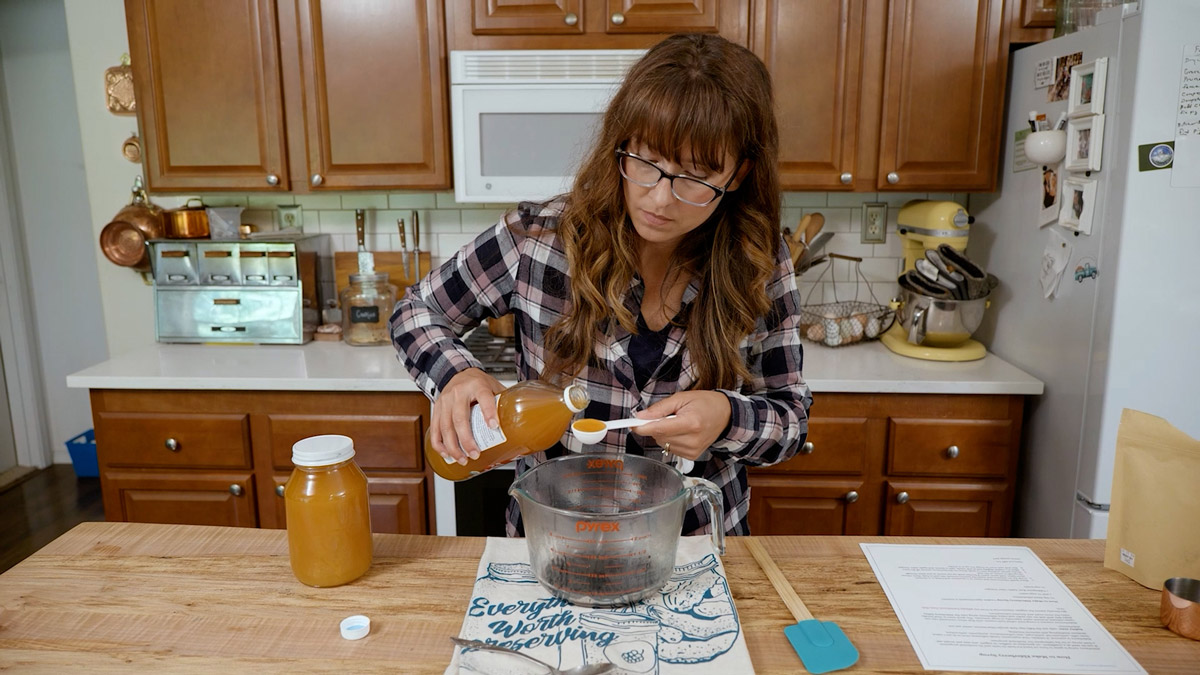
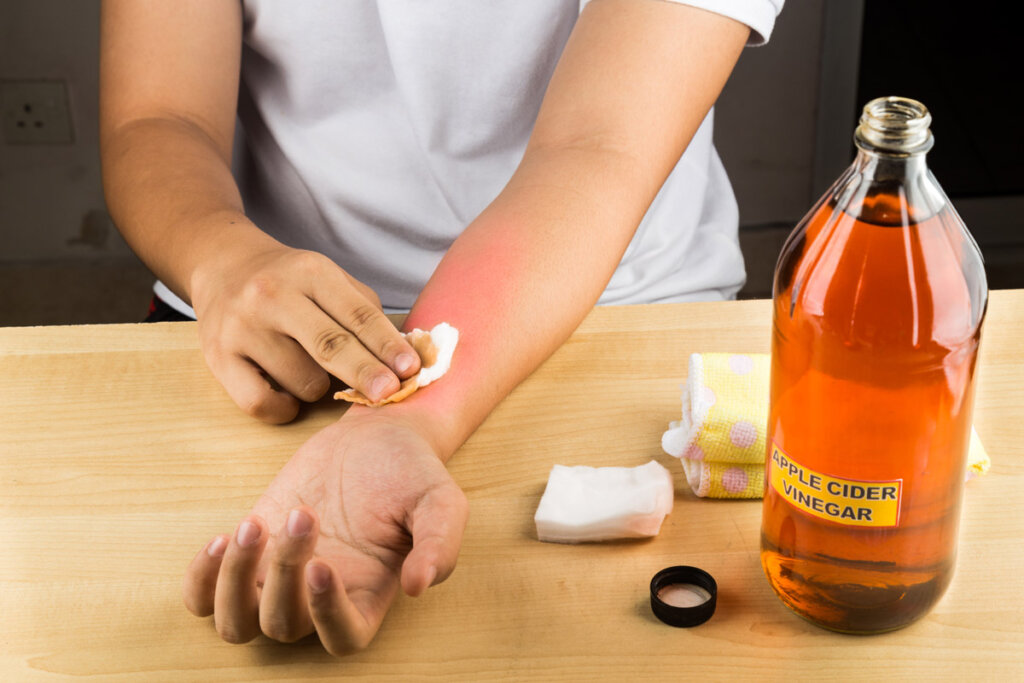
Just as when consuming apple cider vinegar, it's important to always dilute ACV before using topically. Start with a 25% vinegar to 75% water ratio first to see how your skin reacts.
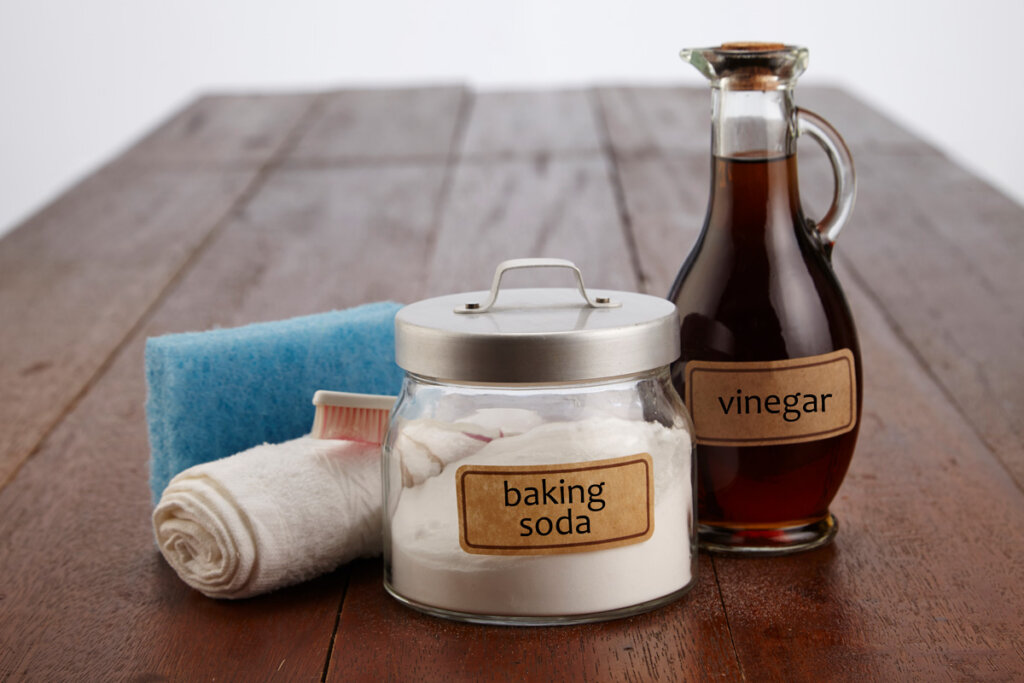

Now that you know just how many uses there are for apple cider vinegar, grab some Fairchild's ACV. And then get some apple scrap vinegar going in your kitchen today!
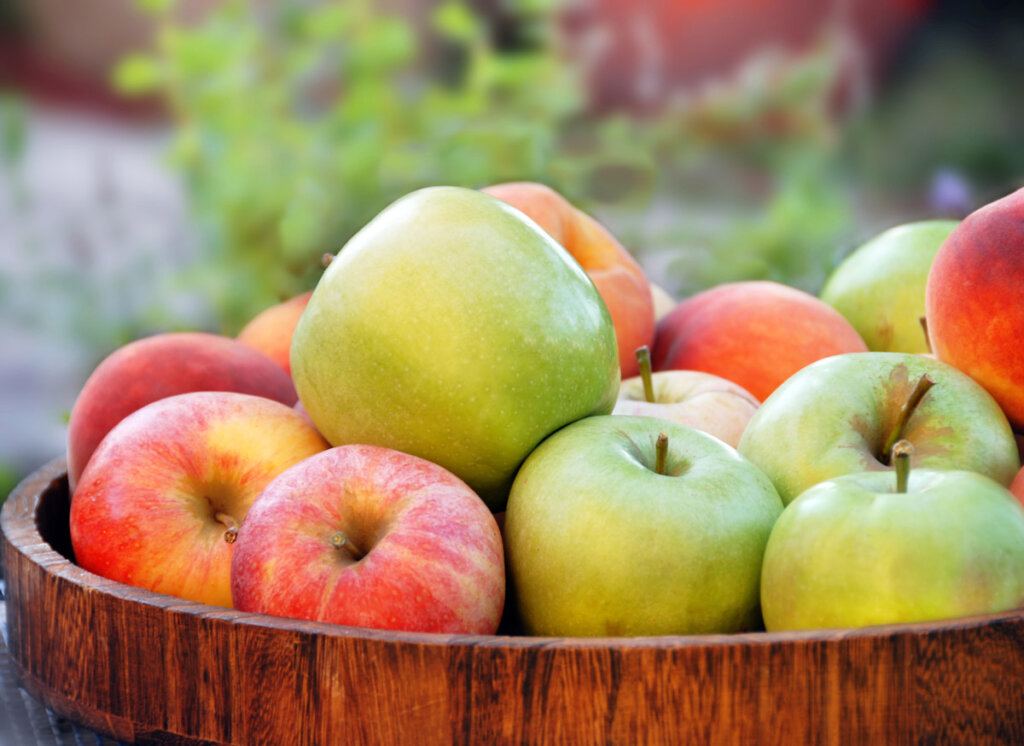
The post 39 Apple Cider Vinegar Uses appeared first on Melissa K. Norris.

As a modern homesteader and natural living pioneer, I absolutely adore having an item I can put to use in many different ways. Especially when said item is one I can make at home with ease.
I love making homemade apple cider vinegar, as well as other homemade fruit vinegars. Looking to preserve your apple harvest? Be sure to check out this post on 12 ways to preserve apples at home.

What is Apple Cider Vinegar?
Apple cider vinegar is simply fermented apples. We're quickly learning that not only is fermentation of our food a way to preserve it (our ancestors knew this), but it also has many health benefits.
Apple cider vinegar contains pectin, B vitamins, folic acid, niacin, Vitamin C, minerals potassium, magnesium, calcium and iron. There are a whole host of uses for this amazing ingredient.

What to Look for In Apple Cider Vinegar
Not all apple cider vinegar is created equal! Whether making homemade apple cider vinegar or buying it at the store. Be sure you're getting or making real, organic, raw apple cider vinegar with the Mother.
Homemade ACV
Homemade apple cider vinegar recipes can vary. For instance, my recipe is actually an apple scrap vinegar, which is a fantastic use of the peels and apples left over after processing them, but apple scrap vinegar won't give you a full-strength homemade whole apple cider vinegar.
For a good homemade apple cider vinegar, check out my ACV recipe here.
Store-Bought ACV
If you're not making ACV at home, then look for one that's raw with the mother. The “Mother” is that kind of cloudy, stringy, cob webby thing floating inside the vinegar. And because apples have such a high pesticide load, go for organic. You also want to make sure the company making the vinegar is using the whole apples (not scraps and cores) and not diluting it with water.
This post is actually sponsored by Fairchild's Apple Cider Vinegar, which is the brand I reach for anytime I'm using apple cider vinegar in a canning recipe or if I run out of my homemade version.
Dangers of Apple Cider Vinegar
Though there's little concern if you're consuming apple cider vinegar correctly, it's important to note that too much apple cider vinegar can cause a reduction in potassium levels and bone density.
Furthermore, undiluted apple cider vinegar can irritate the tissue in the back of the throat and mouth, as well as cause damage to your tooth enamel. Dilution is your friend!
Pro Tip: Whenever canning with any vinegar, it's important for the safety of your recipe not to use homemade ACV because you can't test the acidity level of your homemade vinegars.

What are the Main Uses of Apple Cider Vinegar
- Cooking – We all know how great ACV is when used in salad dressings, or to help prolong the shelf life of my favorite homemade mayonnaise. But that’s not all ACV is good for!
- Health Benefits & Beauty Uses – There are so many unsung uses of apple cider vinegar, especially when it comes to its health benefits and beauty uses.
- Cleaning – Though I don’t recommend cleaning glass or shiny surfaces with ACV that still has the Mother (it can leave streaks), there are tons of other ways to use ACV for cleaning.

Health Benefits of Apple Cider Vinegar
Disclaimer: I'm not a doctor, and this is not providing any kind of diagnosis or treatment. This article is for informational and entertainment purposes only. Check with your healthcare practitioner before making any changes.
Apple cider vinegar is thought to help with many areas of our health.
With apple cider vinegar, a little bit goes a long way. It's best thought to start with 1 to 2 teaspoons and always dilute with water or liquid if drinking it. Some people work up to 1 to 2 Tablespoons per day, but it's not recommended to go over this amount.

Is Drinking Apple Cider Vinegar Good for Gut Health?
“It’s easy to see why people might expect apple cider vinegar to be good for your health.
It’s a rich source of antioxidants called polyphenols, which help support your “good” gut bacteria.
The acetic acid it contains is also antibacterial and antifungal, which explains why people have used vinegar to clean wounds as far back as the Ancient Greeks.
Some people believe that apple cider vinegar’s potential health benefits come from “the mother.”
The mother is the probiotic blend of bacteria and yeasts, which you can see as wispy strands in unfiltered apple cider vinegar.
Probiotic foods contain “good” bacteria that can help to support your gut microbiome — the trillions of bugs that live in your gut. These microbes are essential to good health, and everyone’s gut microbiome is unique.” (Source)

Apple Cider Vinegar for Health
- Diabetes: Apple cider vinegar can help improve insulin sensitivity in diabetic patients. In this study, people drank 2 Tablespoons of apple cider vinegar in water 2 minutes before eating a high carbohydrate meal. They then tested their blood sugar levels at different intervals and showed overall improvement.
- Blood Pressure – Keep in mind, this study was done on rats, not on humans, but there was some promise. It showed that the rat's blood pressure and renin activity were reduced after taking ACV.
- Cholesterol – Again, this study was conducted on rats and not on people, but it does show promise in helping aid the body to maintain a healthier cholesterol level. The study showed some levels of cholesterol were lowered, but not all.
- Weight Loss – This was pretty minimal in overall weight loss, but in a study done in Japan with 175 people, those who used apple cider vinegar lost 1 to 2 more pounds over three months.
- Indigestion or Stomach Acid – If you have stomach acid issues, sometimes it's because of an imbalance of the pH levels in your stomach. Some people swear by drinking a teaspoon or two of apple cider vinegar in a glass of water helps with indigestion or stomach acid issues. Again, consult with your doctor if you have health issues or concerns.
- Soothe a Sore Throat – “Gargling with apple cider vinegar is a popular home remedy for sore throats. It’s anecdotally thought that its antibacterial properties could help kill off the bacteria that could be causing the sore throat. However, there is no evidence to support its use in this way. If you try this at home, make sure you mix the vinegar with water before gargling. This is because apple cider vinegar is very acidic and has been known to cause throat burns when consumed undiluted.” (Source)
- Provide eczema relief – “Some people with eczema use apple cider vinegar to ease their skin symptoms. But some studies reported that it had little effect and irritated some people's skin. Ask your dermatologist if it's OK for you to try it.” (Source)
- Candida Overgrowth – Apple cider vinegar’s anti-fungal properties may benefit those with candida, particularly candida in the mouth. (Source)
- Hemorrhoids – “Hemorrhoid sufferers can find some relief by sitting in a sitz bath with 1/4 cup ACV and warm or cold water. This is especially helpful for women who have pregnancy-related hemorrhoids!” (Source)

Apple Cider Vinegar for Skincare
Just as when consuming apple cider vinegar, it's important to always dilute ACV before using topically. Start with a 25% vinegar to 75% water ratio first to see how your skin reacts.
- Facial Toner/Acne – Apple cider vinegar is acidic and has antibacterial properties, making it a perfect skin toner. The acetic acid in the vinegar helps maintain the pH balance of your skin, especially if you've used a cleaner with soap.
- Hair Rinse – Mix 1 cup of water with 2 to 4 Tablespoons of apple cider vinegar and rinse your hair with it. It helps remove any build-up of hair products and also increases shine.
- Dandruff – Because apple cider vinegar is acidic and has anti-microbial properties, it can work wonders for your scalp. Apply the above rinse to your scalp, working it into the roots of the hair, then rinse. Do this a few times per week until you notice improvement.
- Mouthwash – “Apple cider vinegar is often said to be a useful alternative to commercial mouthwashes. Its antibacterial properties may help with bad breath, although there aren’t any studies examining how effective it is. If you try apple cider vinegar as a mouthwash, make sure you dilute it well with water (the usual amount is 1 tablespoon for every cup, or 240 ml, of water), since the acidity of the vinegar could damage your teeth.” (Source)
- Clean Your Toothbrush – Since ACV has antimicrobial and antibacterial properties, it’s a great option for cleaning your toothbrush! Just add half a cup (120 ml) water with 2 tablespoons (30 ml) apple cider vinegar and 2 teaspoons baking soda. Mix well, then leave the head of your toothbrush in the mixture for 30 minutes. Rinse well and enjoy a squeaky clean mouth.
- Underarm Treatment – I'm all for using natural deodorants, but many of these deodorants use baking soda, and a percentage of people break out from the alkalinity of the baking soda. Using a pre-rinse under the arms of diluted vinegar helps create a more natural pH level and allows some people to use baking soda-based deodorants without irritation.
- Sunburn – Try dabbing apple cider vinegar diluted with cold water onto a sunburn for instant relief.
- Athlete's Foot – Because of ACV's anti-microbial properties, try soaking your feet in a diluted mixture of water and apple cider vinegar to help with athlete's foot.
- Bug Bite – Do you suffer from itchy bug bites that last for days? Try using diluted apple cider vinegar on a cotton ball and placing it on the itch.

Apple Cider Vinegar for Cleaning
- Clogged Drain – Take about ¼ cup of baking soda and dump it down your drain, chase it with vinegar until it stops foaming. Wait about 15 minutes and then pour boiling water down your drain.
- Multi-Purpose Cleaner – Use ¼ to ½ cup apple cider vinegar and dilute with water. Use as a multi-purpose cleaner for counter tops, bathtubs, toilets, sinks, etc. Just be aware that anything you want to have a streak-free shine is not a good option for ACV (mirrors, shiny surfaces, etc.).
- Laundry Booster – Place vinegar and water into the fabric softener dispenser of your washing machine. It helps kill odor causing bacteria, and no, your clothes won't come out smelling like vinegar.
- Faucet Cleaner – You know that gunk around the handles of your sink faucet? Place a vinegar soaked paper towel around it, leave for a few minutes, then come back and wipe clean.
- Floor Cleaner – Instead of using soap to mop your floors (hello soap scum build up) add some vinegar to your warm water and mop the floor with it.
- Fruit Fly Killer – Fruit flies drive me bonkers. Fill the bottom of a small glass jar or bowl with apple cider vinegar and add a couple of drops of dish soap. Fruit flies will come flocking, fall beneath the surface of the soap, and drown.
- Deodorizer – “Apple cider vinegar is known to have antibacterial properties. Because of this, it’s often claimed that apple cider vinegar can eliminate bad smells. There isn’t any research to back up these claims, but you can try it out by mixing 1 part apple cider vinegar with 1 part water to make a deodorizing spray. This makes a natural alternative to odor neutralizers.” (Source)

Apple Cider Vinegar in the Kitchen
- Soak Beans – We all know beans can create a little bit of… ya know, gas. When soaking your dry beans, add a Tablespoon of vinegar to the water and soak for at least 8 hours to help decrease the gas.
- Soak Grains – Vinegar helps break down the phytic acid in grains and flour, which helps many people digest them easier.
- Flakier Pie Crust – Want flaky, melt in your mouth pie crust? The secret ingredient you've been missing is vinegar. Here's my great-grandmother's flaky pie crust recipe. I bet you'll never make another pie crust recipe again!
- No-Knead Bread – Adding a couple of Tablespoons to your no knead bread recipes results in a lighter texture. Try it in this no-knead bread recipe.
- Poached Eggs – If you find poaching eggs a challenge, try adding a splash of ACV to the water. The vinegar helps the egg whites firm up more quickly, eliminating the mess!
- Quick Buttermilk – Let me tell you, real cultured buttermilk makes the best breads and biscuits, but if you don't have buttermilk, don't despair, just add 1 Tablespoon of vinegar to 1 cup milk and let sit for 2 minutes. (Check out these other baking substitutions!)
- Salad Dressing – Make your own salad dressing with 3 parts oil of choice and 1 part vinegar and spices to flavor.
- Marinate Meat – Give your meat a nice sweet-and-sour flavor by using ACV in your marinades. Combine it with wine, garlic, soy sauce, onion, and cayenne pepper to give your steak a delicious flavor.
- Homemade Bone Broth – We all know how easy it is to make homemade bone broth from our veggie scraps and leftover bones. But did you know adding ACV to the pot 20 minutes prior to making your broth can help extract more nutrients from the bones? You won’t taste the vinegar, but you’ll enjoy a more nutritious and flavorful broth!
- Homemade Mayo – Whip up some easy homemade mayo, the vinegar in the recipe helps increase the shelf-life.
- Flavored Vinegar – Don't spend money on those flavored vinegars, make your own! Here's how to make blueberry basil thyme vinegar. You can toss just about any fruit into vinegar. Learn how in this post on making fruit vinegars.
- Produce Wash – Make a vinegar wash to clean your produce before putting it up in the fridge. Use 3 parts water to 1 part vinegar. Do clean your sink first! Let them sit for 5 to 10 minutes, rinse, dry and store in the fridge.
- Homemade Electrolyte Drink – Don't waste your money on sugar-filled sports drinks. Hydrate with this healthy old-fashioned switchel instead!
- Wash Winter Squash – When you bring in your winter squashes, wipe off the outside of them with a towel dampened with vinegar. This will help kill any bacteria and remove any dirt on the surface, helping them last longer while on the shelf.
Now that you know just how many uses there are for apple cider vinegar, grab some Fairchild's ACV. And then get some apple scrap vinegar going in your kitchen today!

Other Articles You May Enjoy
- Herbal Wound Healing Salve
- Comfrey Poultice
- Herbal Stress Relief Capsules (Natural Remedy)
- How to Use Herbs and Natural Remedies at Home
- 5 Rules for Foraging for Wild Edibles
- Cottage Garden
- The Gut-Brain Connection (Info for Better Health)
- Alternative Medicine (& What to Do if Your Medicine Isn’t Available)
- Medicinal Herb Garden (Planning & Growing)
The post 39 Apple Cider Vinegar Uses appeared first on Melissa K. Norris.
